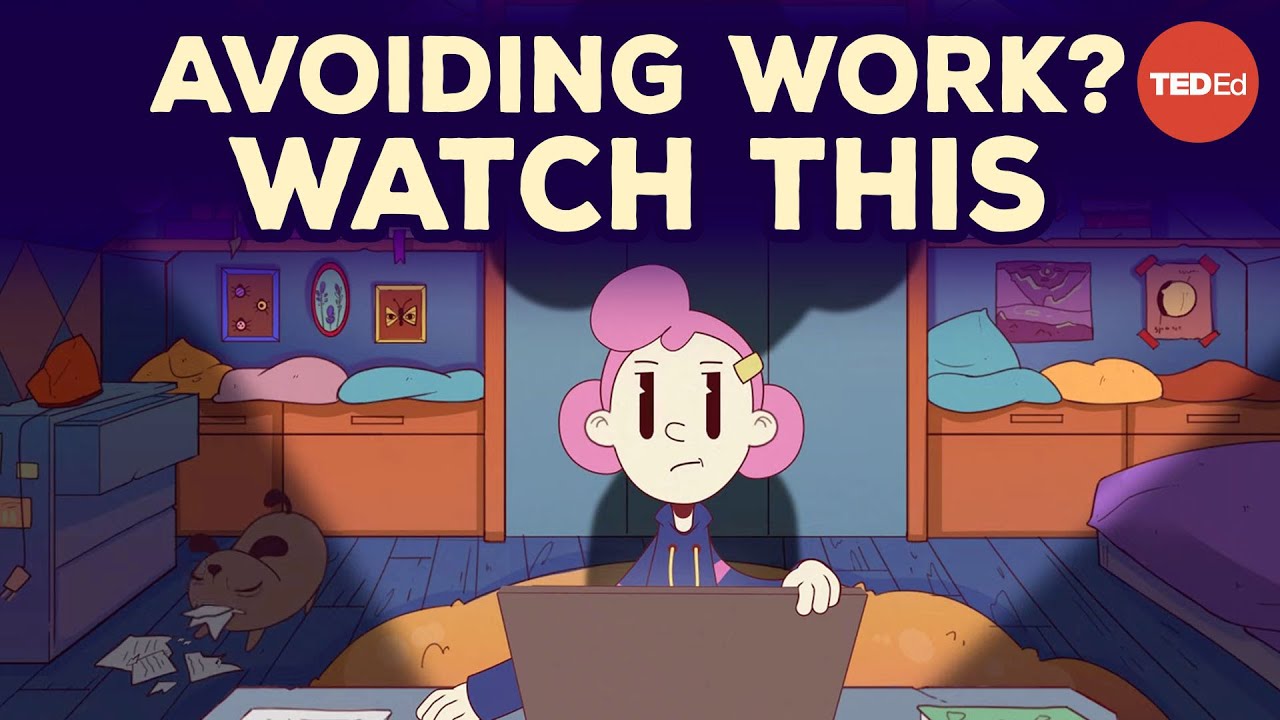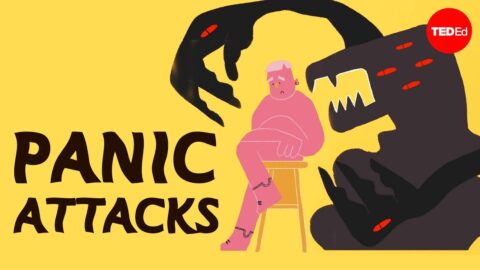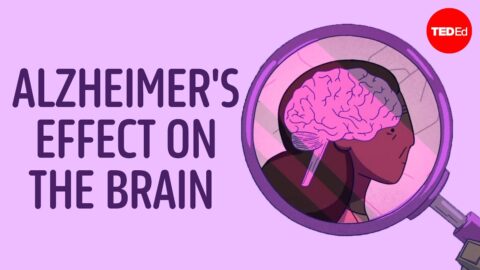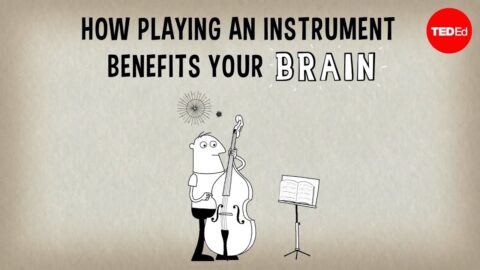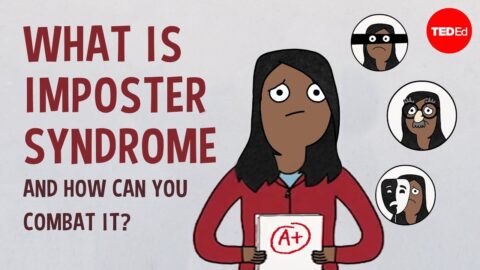It's 5 p.m. and you've just realized that report you've been putting off
São 17h e você acabou de perceber aquele relatório que você estava adiando
is due tomorrow.
é devido amanhã.
It's time to buckle down, open your computer...
É hora de arregaçar as mangas e abrir seu computador...
and check your phone.
e verifique seu telefone.
Maybe catch up on your favorite YouTube channel?
Talvez você possa assistir ao seu canal favorito do YouTube?
Actually, you should probably make dinner first.
Na verdade, você provavelmente deveria fazer o jantar primeiro.
You usually like cooking,
Você geralmente gosta de cozinhar,
though it's hard to enjoy with this work hanging over your head,
embora seja difícil aproveitar com esse trabalho pairando sobre sua cabeça,
and oh— it's actually pretty late!
e oh— na verdade já é bem tarde!
Maybe you should just try again in the morning?
Talvez você devesse tentar novamente de manhã?
This is the cycle of procrastination, and I promise you, we have all been there.
Esse é o ciclo da procrastinação, e eu lhe garanto que todos nós já passamos por isso.
But why do we keep procrastinating even when we know it's bad for us?
Mas por que continuamos procrastinando mesmo quando sabemos que isso é ruim para nós?
To be clear, putting something off isn't always procrastinating.
Para deixar claro, adiar algo nem sempre é procrastinar.
Responsible time management requires deciding which tasks are important
A gestão responsável do tempo requer decidir quais tarefas são importantes
and which ones can wait.
e quais podem esperar.
Procrastination is when we avoid a task we said we would do, for no good reason,
Procrastinação é quando evitamos uma tarefa que dissemos que faríamos, sem um bom motivo.
despite expecting our behavior to bring negative consequences.
apesar de esperarmos que nosso comportamento traga consequências negativas.
Obviously, it's irrational to do something you expect to harm you.
Obviamente, é irracional fazer algo que você espera que lhe cause dano.
But ironically, procrastination is the result of our bodies trying to protect us,
Mas, ironicamente, a procrastinação é o resultado de nossos corpos tentando nos proteger,
specifically by avoiding a task we see as threatening.
especificamente evitando uma tarefa que consideramos ameaçadora.
When you realize you need to write that report,
Quando você percebe que precisa escrever aquele relatório,
your brain responds like it would to any incoming threat.
seu cérebro responde como faria a qualquer ameaça.
Your amygdala, a set of neurons involved in emotional processing
Sua amígdala, um conjunto de neurônios envolvidos no processamento emocional
and threat identification,
e identificação de ameaças,
releases hormones including adrenaline that kick off a fear response.
libera hormônios, incluindo adrenalina, que desencadeiam uma resposta de medo.
This stress-induced panic can overpower the impulses from your prefrontal cortex,
Esse pânico induzido pelo estresse pode dominar os impulsos do seu córtex pré-frontal,
which typically help you think long term and regulate your emotions.
que normalmente ajudam você a pensar a longo prazo e regular suas emoções.
And it's in the midst of this fight, flight, or freeze response
E é no meio dessa resposta de luta, fuga ou congelamento
that you decide to handle the threat
que você decida lidar com a ameaça
by avoiding it in favor of some less stressful task.
evitando-a em favor de alguma tarefa menos estressante.
This response might seem extreme
Esta resposta pode parecer extrema
after all, it's just a deadline, not a bear attack.
afinal, é apenas um prazo, não um ataque de urso.
But we're most likely to procrastinate tasks that evoke negative feelings,
Mas é mais provável que procrastinemos tarefas que evocam sentimentos negativos,
such as dread, incompetence, and insecurity.
como medo, incompetência e insegurança.
Studies of procrastinating university students have found participants
Estudos com estudantes universitários procrastinadores descobriram que os participantes
were more likely to put off tasks they perceived as stressful or challenging.
eram mais propensos a adiar tarefas que consideravam estressantes ou desafiadoras.
And the perception of how difficult the task is
E a percepção de quão difícil é a tarefa
increases while you're putting it off.
aumenta enquanto você adia.
In one experiment, students were given reminders to study throughout the day.
Em um experimento, os alunos receberam lembretes para estudar durante o dia.
While they were studying, most reported that it wasn't so bad.
Enquanto estudavam, a maioria relatou que não era tão ruim.
But when they were procrastinating,
Mas quando eles estavam procrastinando,
they consistently rated the idea of studying as very stressful,
eles consistentemente classificaram a ideia de estudar como muito estressante,
making it difficult to get started.
dificultando o início.
Because procrastination is motivated by our negative feelings,
Porque a procrastinação é motivada pelos nossos sentimentos negativos,
some individuals are more susceptible to it than others.
alguns indivíduos são mais suscetíveis a ela do que outros.
People who have difficulty regulating their emotions
Pessoas que têm dificuldade em regular suas emoções
and those who struggle with low self-esteem
e aqueles que lutam contra a baixa autoestima
are much more likely to procrastinate,
são muito mais propensos a procrastinar,
regardless of how good they are at time management.
independentemente de quão bons eles sejam em gerenciamento de tempo.
However, it's a common misconception that all procrastinators are lazy.
No entanto, é um equívoco comum pensar que todos os procrastinadores são preguiçosos.
In the body and brain, laziness is marked by no energy and general apathy.
No corpo e no cérebro, a preguiça é marcada pela falta de energia e apatia geral.
When you're feeling lazy, you're more likely to sit around doing nothing
Quando você está com preguiça, é mais provável que você fique sentado sem fazer nada
than distract yourself with unimportant tasks.
do que se distrair com tarefas sem importância.
In fact, many people procrastinate because they care too much.
Na verdade, muitas pessoas procrastinam porque se importam demais.
Procrastinators often report a high fear of failure,
Os procrastinadores frequentemente relatam um grande medo do fracasso,
putting things off because they're afraid their work
adiando as coisas porque têm medo do seu trabalho
won't live up to their high standards.
não corresponderão aos seus altos padrões.
Whatever the reason for procrastination, the results are often the same.
Seja qual for o motivo da procrastinação, os resultados geralmente são os mesmos.
Frequent procrastinators are likely to suffer from anxiety and depression,
Os procrastinadores frequentes tendem a sofrer de ansiedade e depressão,
ongoing feelings of shame,
sentimentos contínuos de vergonha,
higher stress levels and physical ailments associated with high stress.
níveis mais altos de estresse e doenças físicas associadas ao alto estresse.
Worst of all, while procrastination hurts us in the long run,
Pior de tudo, embora a procrastinação nos prejudique a longo prazo,
it does temporarily reduce our stress level,
isso reduz temporariamente nosso nível de estresse,
reinforcing it as a bodily response for coping with stressful tasks.
reforçando-a como uma resposta corporal para lidar com tarefas estressantes.
So, how can we break the cycle of procrastination?
Então, como podemos quebrar o ciclo da procrastinação?
Traditionally, people thought procrastinators needed to cultivate
Tradicionalmente, as pessoas pensavam que os procrastinadores precisavam cultivar
discipline and practice strict time management.
disciplina e prática rigorosa de gestão do tempo.
But today, many researchers feel the exact opposite.
Mas hoje, muitos pesquisadores sentem exatamente o oposto.
Being too hard on yourself can layer additional bad emotions onto a task,
Ser muito duro consigo mesmo pode adicionar emoções ruins a uma tarefa,
making the threat even more intense.
tornando a ameaça ainda mais intensa.
To short-circuit this stress response,
Para curto-circuitar esta resposta ao estresse,
we need to address and reduce these negative emotions.
Precisamos abordar e reduzir essas emoções negativas.
Some simple strategies include breaking a task into smaller elements
Algumas estratégias simples incluem dividir uma tarefa em elementos menores
or journaling about why it's stressing you out
ou escrever um diário sobre o porquê de estar estressado
and addressing those underlying concerns.
e abordar essas preocupações subjacentes.
Try removing nearby distractions that make it easy to impulsively procrastinate.
Tente remover distrações próximas que facilitam a procrastinação impulsiva.
And more than anything, it helps to cultivate an attitude of self-compassion,
E mais do que tudo, ajuda a cultivar uma atitude de autocompaixão,
forgiving yourself, and making a plan to do better next time.
perdoando a si mesmo e fazendo um plano para fazer melhor na próxima vez.
Because a culture that perpetuates this cycle of stress and procrastination
Porque uma cultura que perpetua esse ciclo de estresse e procrastinação
hurts all of us in the long term.
prejudica a todos nós a longo prazo.
Legenda Anterior
Pronunciar Palavra
Traduzir Frase Atual
Pausar / Play
Aumentar Fonte Legenda
Próxima Legenda
Pronunciar Frase
Dois Cliques para Salvar Palavra
Desativar Legenda / Ativar Legenda
Diminuir Fonte Legenda

